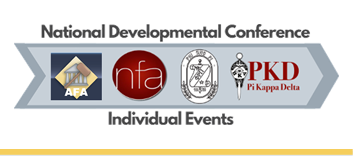Document Type
Limited Preparation Events
Abstract
It usually takes more than three weeks to prepare a good impromptu speech. - Mark Twain
The humor in Twain's often-referenced quotation is more readily apparent to those outside of the forensics community than to those within. Ironically, a student addressing this quotation in competition would likely disagree with the quotation, because, well, it seems like one should. Two "arguments" would ensue—one trumpeting the importance of preparation, and a second reaffirming the value of free speech. After hearing these truisms "supported" by Festinger's Theory of Cognitive Dissonance, the Dalai Lama's new PR strategy of emptiness, Maslow's Hierarchy of Needs, and those feisty boys from George Orwell's Lord of the Flies (yes, the author is aware that Orwell did not write Lord of the Flies, but a student in the 2007 NFA final round was not), a judge would be expected to comment intelligently on the fluent, at times almost human, presentation. And so the examples that were neatly packaged weeks earlier would stand in opposition to Twain's observation about preparing what is typically not prepared in advance. In actuality, the arguments and examples would be irrelevant to an understanding of the quotation, but such is the nature of the game. "Our tournament champion in generic exemplification is ..."
Language matters. This point is not lost on any serious student, teacher or scholar of rhetoric. Burke (1957, 1961) claims that language represents "strategic, stylized" responses to the human condition. The label assigned is loaded with meaning, allowing the agent to accept or reject the prevailing context or condition (Burke, 1952). When something is assigned a label, a suggestion is made regarding what the thing is, and what it is not. When forensic educators use the terms "impromptu" and "extemporaneous" in journals or at conferences, the words suggest modes of delivery associated with speeches developed in a limited time frame. However, the pedagogy of practice that has emerged over the past three decades works against the nature of these terms and the intent of these events. When "limited preparation" really means advanced preparation, when "impromptu" rewards the use of examples fully pre-prepared and "extemporaneous" punishes only the deliveries that are truly extemporaneous, then perhaps the forensics community is experiencing an accurately-referenced Orwellian nightmare. Our language betrays us.
Creative Commons License

This work is licensed under a Creative Commons Attribution 4.0 International License.
Rights Statement
In Copyright https://rightsstatements.org/page/InC/1.0/?language=en
Recommended Citation
Richardson, R. Randolph
(2010)
"Thinking Outside the Can: Restoring the Value, Teaching and Practice of Limited Preparation in Limited-Prepartin Events,"
Proceedings of the National Developmental Conference on Individual Events: Vol. 5:
Iss.
1, Article 18.
Available at:
https://cornerstone.lib.mnsu.edu/ndcieproceedings/vol5/iss1/18

